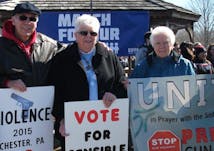 As previously noted, the Sisters of St. Francis of Philadelphia have been leading dialogues with Wells Fargo for over 10 years. During the past two years, those meetings and dialogues were frequent and sometimes intense. But through collaborative shareholder engagement supported by a team of ICCR members, we have moved Wells Fargo to produce and publish its Business Standards Review Report on ethics and culture, human rights and a host of other issues. “Investors note there is much work to be done but commend the process and disclosure. (https://www.iccr.org/investors-say-if-fully-operationalized-wells-fargos-business-standards-report-can-serve-road-map-its) The shareholders caution that while the report is a good beginning, the company still has much work to do to redeem its credibility and restore customer trust. Read the press release, https://www.iccr.org/investors-say-if-fully-operationalized-wells-fargos-business-standards-report-can-serve-road-map-its.
As previously noted, the Sisters of St. Francis of Philadelphia have been leading dialogues with Wells Fargo for over 10 years. During the past two years, those meetings and dialogues were frequent and sometimes intense. But through collaborative shareholder engagement supported by a team of ICCR members, we have moved Wells Fargo to produce and publish its Business Standards Review Report on ethics and culture, human rights and a host of other issues. “Investors note there is much work to be done but commend the process and disclosure. (https://www.iccr.org/investors-say-if-fully-operationalized-wells-fargos-business-standards-report-can-serve-road-map-its) The shareholders caution that while the report is a good beginning, the company still has much work to do to redeem its credibility and restore customer trust. Read the press release, https://www.iccr.org/investors-say-if-fully-operationalized-wells-fargos-business-standards-report-can-serve-road-map-its.
In many ways, the Business Standards Review is an historical document because it is a response to a long awaited call for moral and ethical clarity on the business standards of Wells Fargo at a time when the company was in a deep–seated cultural and moral crisis. This document is about bringing systemic change to a corporate culture that had a major integrity disconnect; operated out of a high pressured environment; and is still struggling to restructure, define, and reimage itself. We had multiple opportunities to collaboratively analyze the numerous cultural, ethical, and moral issues while the bank reached deeply into its corporate soul to find it possible to acknowledge publicly its abuse of customers, team members, and investors.
We acknowledge and apologize for these and other mistakes and have taken significant actions to improve our culture, make things right for customers who were harmed, transform our organizational structure and business practices, increase transparency, and strengthen risk management and controls. (Page 1)
Our focus is on human rights and home mortgage crisis. As it now stands, the Business Standards Review is a definitive public acknowledgement and commitment to put into motion all those “good ethical guidelines,” practices, and policies that will be needed to verify the above statement from page one. While we stand in solidarity with all those who have been violated, we see it as imperative that the company exercise human rights due diligence in all its operations as never before and recommit to customers being made whole. We expect that the process will be guided by the UN Guiding Principles on Business and Human Rights (UNGP) which provides a “road map” for the company, its business relationships, and all stakeholders on how to ensure respect for human rights and remedy human rights abuses when they occur. A fully activated human rights policy includes risk and impact assessment; integration of impact assessment findings into management systems; and monitoring progress to mitigate impacts, remediation, and disclosure. The company’s human rights policy must be operationalized in line with the standards laid out in the UNGP, including the corporate responsibility to respect human rights and remedy adverse impacts as in providing financial lines of credit to private prisons, the gun industry, financing environmental projects in the extractive industry, and resolving the hundreds and hundreds of home mortgage loan modifications.
According to the Government Accountability Office, “mortgages originated from 2004 through 2007 accounted for the majority of troubled loans.” The Office of the Comptroller of the Currency reported that as of June 30, 2011, nationwide 28.1% of subprime and higher cost loans were seriously delinquent or in foreclosure as compared to only 5.5% of prime loans. In 2006, Wells Fargo originated approximately $74.2 billion in subprime loans—more than any other lender in the nation. Wells Fargo has failed to address many of these subprime loans and has failed seriously to address loan modification for homeowners who have been seeking modifications for a period of 10 years. Presently I am working with numerous homeowners, lawyers, and experts in the home mortgage field who are interacting with a care and recovery group within Wells Fargo to rectify severe human rights and home mortgage abuses in this business line at Wells Fargo. It is evident that the company is still failing its customers in this area. Mediations with homeowners are in progress and there is clear evidence that the homeowners’ documentation in most cases identifies Wells Fargo as predatory—either through internal lack of competence or in using abusive outside council that is in the business of “greed.” While telling me that the company would review a homeowner’s complaint already filed, Wells Fargo filed a motion to dismiss the complaint and has yet to communicate with the homeowner (who actually lost her home two years ago). She not only lost her home but, due serious health issues, she also lost her business, her credit, and her dignity. We have identified numerous cases that are similar to this one.
Dealing with subprime loans, regular loans needing a modification, and ultimately foreclosures not only negatively impacts a borrower’s financially, but also affects their health and wellbeing. Home Foreclosure, Health, and Mental Health; A Systematic Review of Individual, Aggregate, and Contextual Associations by Alexander C. Tsai, published April 7, 2015, by the U.S. National Library of Medicine National Institutes of Health states, “Home foreclosure adversely affects health and mental health through channels operating at multiple levels: at the individual level, the stress of personally experiencing foreclosure was associated with worsened mental health and adverse health behaviors, which were in turn linked to poorer health status; at the community level, increasing degradation of the neighborhood environment had indirect, cross-level adverse effects on health and mental health.”
To align with the bank’s stated goals of transparency and remediation, we will continue to engage with the bank on all aspects of this report while still asking for evidence of one corporate culture that is consistent across all business lines. More transparency about instances of different interpretations of culture throughout the company will help ground the process. We will seek data that demonstrates that there are shared behavioral indicators across the company as it embraces one corporate culture. Given the nature of the harm that has been caused and the serious erosion of trust, Wells Fargo will need to rebuild the trust and confidence of its team members, customers, and investors by providing evidence that demonstrates the changes have begun.
Sr. Nora Nash attended the hearings of Tim Sloan by the House Financial Services Committee and shortly thereafter, Tim Sloan retired. Still more questions than answers!







